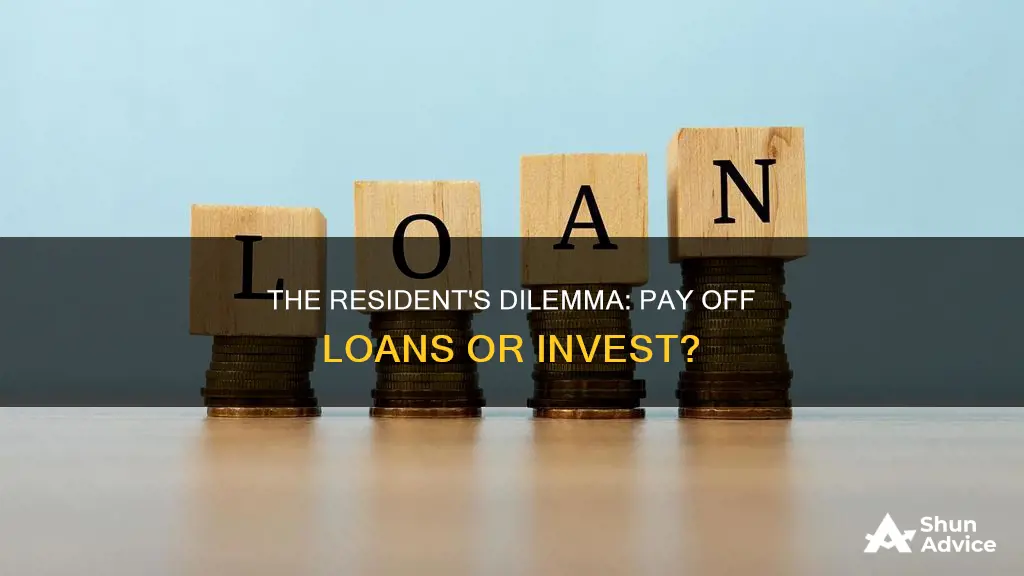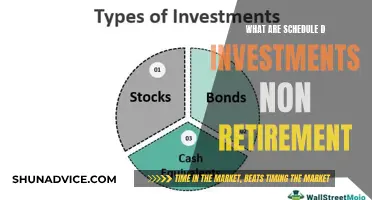
Whether to pay off loans or invest during residency is a common question among interns and residents. Some choose to invest all their extra money in Roth accounts, while others opt to pay off their loans relatively quickly. The decision depends on various factors, such as the interest rate on the loans, expected future earnings, and financial goals. Some residents choose to enter REPAYE (an income-driven repayment plan) during residency, which can lower their effective interest rate. Others may decide to refinance their loans to take advantage of lower interest rates. Ultimately, there is no one-size-fits-all answer, and residents should carefully consider their financial situation and goals before deciding whether to pay off loans or invest during residency.
What You'll Learn

Paying off a loan early vs. investing: which has better returns?
Whether you should pay off a loan early or invest depends on your financial situation, the interest rate on the loan, and your risk tolerance. Here are some things to consider when deciding between paying off a loan early and investing:
Paying off a Loan Early
Paying off a loan early can provide several benefits:
- Interest savings: Paying off a loan early can result in significant interest savings, which is essentially a guaranteed return on your investment.
- Peace of mind: Being debt-free can ease your financial burden and provide a sense of security.
- Build equity: Paying down a mortgage faster can help you build equity in your home, which can be leveraged for refinancing or home improvement.
However, there are also some potential drawbacks to consider:
- Opportunity cost: Paying off a loan early means you may have less money available for other financial goals, such as retirement savings or investment opportunities.
- Wealth is tied up: Property is an illiquid asset, so accessing your money in an emergency or investment opportunity would require selling your home.
- Loss of tax breaks: Paying off a mortgage early may cause you to lose out on tax deductions for mortgage interest.
Investing
Investing your money instead of paying off a loan early can offer the following advantages:
- Higher returns: Investing in the stock market or other vehicles can potentially provide higher returns compared to the interest saved by paying off a loan early.
- Liquidity: Investments in stocks, bonds, or mutual funds offer more liquidity than home equity, allowing you to access your money more easily.
- Employer match: Investing in a retirement account may come with an employer match, providing additional funds for your savings.
However, there are also risks and considerations to keep in mind:
- Higher risk: The stock market is more volatile than the housing market, and you need to ensure your investment strategy aligns with your risk tolerance.
- Increased debt: If you choose to invest instead of paying off your loan, you will still have debt tied to your name, and there is a risk of losing your home if you can't make the payments.
The answer depends on various factors, including the interest rate on your loan, the potential returns on your investments, and your financial goals and risk tolerance. Here are some key points to consider:
- Interest rates: If your loan has a high-interest rate, particularly above 6%, it is generally advisable to prioritize paying it off before investing. Credit card debt, for example, typically carries high-interest rates, making it more cost-effective to pay it off first.
- Investment returns: If you can invest in vehicles that offer higher potential returns than the interest rate on your loan, investing may be the better option. For example, if you can earn an average annual return of 10% in the stock market, it may make more sense to invest rather than paying off a loan with a 5% interest rate.
- Financial goals and risk tolerance: Consider your financial goals and risk tolerance. If you are comfortable with the volatility of the stock market and are focused on long-term wealth accumulation, investing may be preferable. On the other hand, if you prioritize peace of mind and financial security, paying off a loan early can reduce your debt and provide guaranteed interest savings.
In summary, there is no one-size-fits-all answer to whether paying off a loan early or investing will provide better returns. The best approach depends on your individual circumstances, interest rates, investment opportunities, and financial goals. It may even be possible to balance both by making additional payments towards your loan while still allocating a portion of your funds towards investments.
Should You Invest in GE Now?
You may want to see also

The pros and cons of paying off a loan early
Paying off a loan early can be a great idea, but it's not always the best strategy. Here are some pros and cons to help you decide whether or not to pay off your loan early:
Pros of Paying Off a Loan Early:
- Save Money on Interest: Paying off a loan faster reduces the total cost of borrowing by minimising the interest paid over the loan term.
- Improved Monthly Budget: Eliminating the recurring monthly payment frees up money for other expenses, financial goals, or savings.
- Lower Debt-to-Income Ratio: Reducing debt relative to income improves your credit score and makes you more attractive to lenders, potentially qualifying you for better loan terms and rates in the future.
- Peace of Mind: Being free of debt reduces financial pressure and stress, improving your overall well-being.
Cons of Paying Off a Loan Early:
- Prepayment Penalties: Some lenders include prepayment penalty clauses to recoup interest losses, which can negate the savings from paying off a loan early, especially with low-interest or short-term loans.
- Negative Impact on Credit Score: Paying off a loan early can temporarily lower your credit score by reducing your credit mix and shortening your credit history.
- Alternative Uses for Money: If the loan interest rate is low, you may be better off investing the money elsewhere, such as in a high-yield savings account or paying off higher-interest debt.
Bonds: A Safe Haven for Investors
You may want to see also

The pros and cons of investing
Investing your money can be a great way to build wealth, but it's not without its risks. Here are some pros and cons of investing to consider when deciding whether to pay off your loan during residency or invest.
Pros of Investing
- Building Wealth: Over long periods, the stock market has averaged annual gains of close to 10%, allowing investors to build massive wealth over time.
- No Expertise Required: You don't need a degree in finance or to be a stock market expert to invest successfully. Opting for low-fee, broad-market index funds or ETFs can provide similar returns to the overall stock market without the need for in-depth knowledge.
- Diversity of Options: There are many different types of stocks and investments to choose from, allowing you to diversify your portfolio and reduce risk. You can invest in different companies, industries, and sectors, as well as different types of assets such as stocks, bonds, and commodities.
- Low Barrier to Entry: You can start investing with a small amount of money. Many brokers allow you to buy and sell stocks commission-free, and some don't require account minimums. Fractional shares are also an option if you want to invest in more expensive stocks.
- Liquidity: Stocks offer high liquidity, meaning you can sell your shares and access your money quickly if needed.
- Beating Inflation: Investing in stocks can help you stay ahead of inflation and grow your assets. Stocks have historically provided higher returns than inflation, bonds, savings accounts, or other low-risk investments.
Cons of Investing
- Risk of Loss: Investing in the stock market is risky, and you may lose some or all of your investment. The stock market can be volatile, with corrections, crashes, and fluctuations. Even well-researched investments may not work out as planned.
- Time Commitment: Investing in stocks requires time and research. You need to research and monitor the companies you invest in, as well as the overall stock market.
- Taxes: Profitable stock sales may be subject to capital gains taxes.
- Emotional Rollercoaster: The ups and downs of the stock market can be emotionally challenging, especially if you constantly monitor price fluctuations.
- Competition: Institutional investors and professional traders have more time, knowledge, tools, and resources at their disposal, which can put individual investors at a disadvantage.
- Not a Quick Fix: Building wealth through stocks takes time, often decades. It requires patience and a long-term commitment.
In summary, investing offers the potential for high returns and wealth creation but carries significant risks and requires a long-term perspective. When deciding whether to pay off your loan during residency or invest, carefully consider your financial situation, risk tolerance, and time horizon.
Pension Investment: Choosing Wisely
You may want to see also

How to decide between paying off a loan and investing
When deciding whether to pay off a loan or invest, there are several factors to consider.
Firstly, it is important to assess the interest rate on your loan. If you have a high-interest loan, it may be more beneficial to pay it off first, as this will save you money in the long run. Conversely, if you have a low-interest loan, investing your money may be a better option, as you can potentially earn a higher return on your investment than you would save by paying off the loan early.
Another factor to consider is your risk tolerance. Investing in the stock market can provide higher returns than paying off a loan, but it also comes with higher risks. The stock market can be volatile, and you may lose money if the market declines. On the other hand, paying off a loan early guarantees a return on your investment in the form of interest savings.
Your financial goals and circumstances should also be considered. If you are close to retirement or have other financial priorities, such as saving for a house or building an emergency fund, paying off your loan may be a more prudent choice. Additionally, if you are eligible for tax deductions or employer matches on your investments, this may sway your decision towards investing.
It is worth noting that you don't necessarily have to choose one option exclusively. You can opt for a compromise by making small additional contributions towards paying down your loan while also investing for your retirement. This approach can be advantageous, especially in the early phases of a loan when even small contributions can significantly reduce the total interest you pay.
Ultimately, the decision to pay off a loan or invest depends on your individual circumstances, risk tolerance, and financial goals. It may be beneficial to consult a financial advisor to help you analyse your situation and make an informed decision.
Investments: Vanguard's Guide to Choosing Wisely
You may want to see also

The benefits of refinancing
Refinancing can be a great way to leverage your home as an investment and improve your financial situation. Here are the key benefits of refinancing:
Lower Interest Rates and Monthly Payments
Refinancing can help you secure a lower interest rate, which can result in significant savings over the term of your loan. A reduced interest rate often leads to lower monthly mortgage payments, freeing up cash for other financial goals or expenses.
Pay Off Your Loan Early
Refinancing allows you to reduce the term of your loan. For example, you can switch from a 30-year loan to a 20-year loan with a lower interest rate, helping you become debt-free sooner.
Switch to a Fixed-Rate Mortgage
If you have an adjustable-rate mortgage (ARM), refinancing lets you switch to a fixed-rate mortgage. This provides stability and protects you from future interest rate hikes. On the other hand, if you already have a fixed-rate mortgage, refinancing can give you the option to switch to an ARM with a lower initial rate if you plan to move in a few years.
Access Funds for Other Goals
Refinancing allows you to tap into your home's equity and access cash that can be used for various purposes. You can use this money for home improvements, repairs, paying off high-interest debt, or covering large expenses such as medical bills or college tuition.
Remove Private Mortgage Insurance (PMI)
Refinancing gives you the opportunity to remove PMI from your loan, reducing your overall expenses. This is especially beneficial if your loan-to-value (LTV) ratio is less than 80% due to a combination of a reduced loan amount and an increased home value.
Insurance: A Safe Investment Bet?
You may want to see also
Frequently asked questions
Paying off your loan during residency can give you peace of mind and save you money in the long run. You could save thousands or tens of thousands of dollars in interest payments.
The biggest benefit of investing your money instead of using it to pay down your loan faster is the ROI. Average stock market returns have been higher than mortgage rates, so you stand to gain quite a bit from the difference.
Some factors to consider include the interest rate on your loan, your expected salary after residency, and your risk tolerance. If you have a high-interest loan, it may be better to pay it off first. If you expect to have a high salary after residency, you may be able to pay off your loans quickly after residency and could consider investing during residency. If you have a low risk tolerance, paying off your loan may be a better option as investing in the stock market carries more risk.







